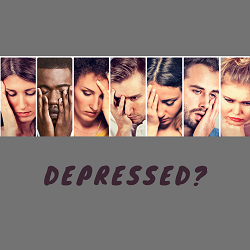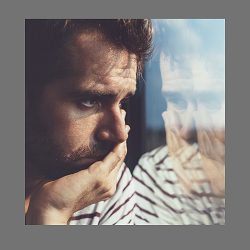What is depression?
These days, it’s not uncommon to hear the expression, “I am so depressed right now”. But depression is very different than feeling sad after a breakup or irritable after a difficult day at work. Depression is an all-consuming sadness that affects every area of your life. When someone is depressed, they feel sad most of the time and believe that things “will never get better again”. For those who have experienced depression, no explanation is necessary to describe how it feels. But for those who have never experienced it, no explanation is sufficient to accurately describe the experience.
A clinical depressive disorder not only changes how you feel but how you think and behave. Depression affects your thoughts, behaviors, interactions with others, sleep, and work because it becomes the lens through which you see the world. For some, depression manifests in irritability, agitation, and anger. For others, it feels as if you are living underwater with earmuffs on – the world feels blurry, heavy, and grey.
Depression comes in many shapes and sizes and ranges in severity from mild to major. It can be triggered by a singular event or seem to come out of nowhere. Fortunately, depression can be treated.
Signs and symptoms to be aware of.
Signs of depression look different for different people and not everyone who is depressed will exhibit all of the following signs. Similarly, someone who is not depressed may, from time to time, show one or more of these symptoms. The important thing to notice is how often you are experiencing these signs and for how long.
-
Unshakeable feelings of hopelessness and despair – you can’t imagine ever feeling happy again.
-
Fatigue – you feel tired and heavy all of the time.
-
Disengagement – not wanting to do the things you used to enjoy or interact with others.
-
Troubled sleep – oversleeping and difficulty getting out of bed, as well as waking many times in the night or insomnia.
-
Anxiety – excessive worry and racing thoughts.
-
Difficulty going to work or keeping a job.
-
Overwhelming emotions or irritability – your temper is short and you lash out often.
-
Trouble concentrating – your brain feels slow and foggy, you have difficulty staying on task.
-
Physical pains with no explanation – headaches, backaches, and stomach aches.
-
Criticism of self – low self-esteem, self-loathing, and negative self-talk.
-
Changes in weight and appetite – both overeating and weight gain and loss of appetite and shedding weight.
-
Dangerous behavior – taking unnecessary risks that increase your chances of death.
It is important to stay aware of these signs because a potential danger of depression is suicide. Feeling deep despair and hopelessness can sometimes cause a person to think that the only way out of what they are feeling is to end their life. If you or someone you know appears to be at risk for suicide, seek help immediately.
How to treat depression.
Unlike other medical issues, there is no single, straightforward treatment for depression. Instead, because there are many different causes for it – including a combination of biological, psychological, and social factors that vary from person to person – treatment options and plans vary,
Biological factors such as brain chemistry and hormonal changes can certainly influence depression. Social factors such as past traumas and loneliness do as well. Lifestyle choices such as the job you work, how much exercise you get, and what foods you eat will also influence your mental and emotional health. If you are currently experiencing depression, the isolation from others and disconnection from friends and family due to COVID-19 and the stay-at-home-orders may be contributing factors.
Fortunately, there are many things you can do for yourself if you have been diagnosed with depression or even when you just aren’t feeling your best. The first is to use movement and exercise to naturally boost your mental health. Second, eat a healthy diet full of plants and vegetables while decreasing your consumption of alcohol, caffeine, and refined sugars, all of which lead to emotional highs and lows. Third, reach out for connection with friends, family, and the community around you. Even in the current climate, smiling at others on the street or talking to a sibling on the phone can make us feel less alone. Finally, volunteer your time and be of service to others.
With this said, however, there are times when it is appropriate to seek outside, professional help, and therapy is an excellent treatment option. Therapy can help you identify and resolve the underlying issues that are causing your depression as well as give you tools and insights to keep your spirits high and prevent depression in the future.
In extreme situations, prescription medication may be needed. Consult with a therapist or a doctor to learn when medication is necessary and the possible side effects. You should also have a plan in place for how to self-manage and regulate your emotional health so that long-term medication is not your only option.
Should you choose to seek professional help, our therapists at the Relationship Therapy Center are here to support you. Contact us today with any questions or to schedule your first session. We look forward to meeting you.
Other Services offered at The Relationship Therapy Center in California:
In addition to depression treatment, Our Sacramento area counseling clinics located in Roseville and Fair Oaks, CA are pleased to offer a variety of mental health services. We will discuss the importance of self-care and emotional support to help you cope and to discover ways to find healthy ways of dealing with stress.
Depression treatment can be beneficial, with the right therapist. Our compassionate therapists are trained to walk you through the process and help you find healing and peace. Please contact our therapy office to learn more about the many ways we can help you and your loved ones heal, grow, and love healthy.




